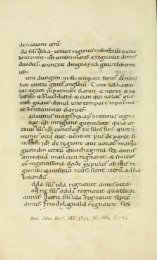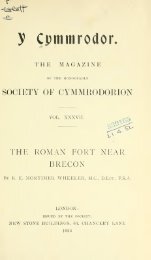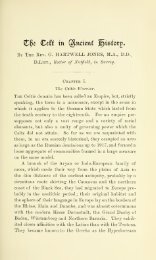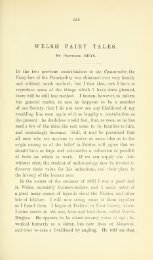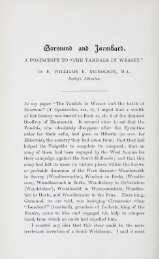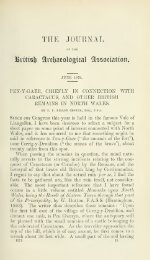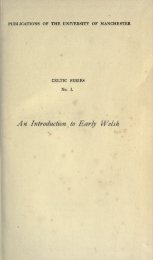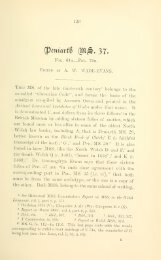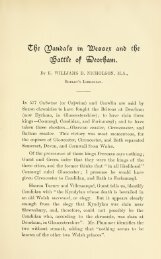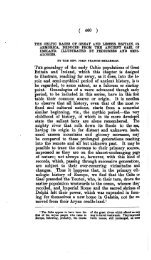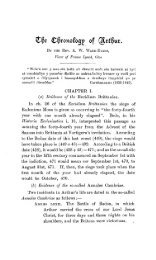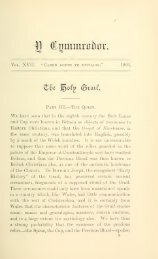Merlin_and_Merlinian_Poems (vol 45) - Arthur Pendragon of Wales
Merlin_and_Merlinian_Poems (vol 45) - Arthur Pendragon of Wales
Merlin_and_Merlinian_Poems (vol 45) - Arthur Pendragon of Wales
Create successful ePaper yourself
Turn your PDF publications into a flip-book with our unique Google optimized e-Paper software.
123<br />
MERLIN AND THE MERLINIAN POEMS.<br />
PART I.<br />
MERLIN.<br />
BY JOHN VEITCH, ESQ., LL.D., PROFESSOR OF LOGIC AND RHETORIC,<br />
UNIVERSITY OF GLASGOW.<br />
(Read at the Glasgow Congress, 29 Aug. 1888.)<br />
OXE <strong>of</strong> the most obscure periods <strong>of</strong> British history, as<br />
regards details, is the epoch from 410 the date <strong>of</strong> the<br />
Roman evacuation <strong>of</strong> Britain to the close <strong>of</strong> the sixth<br />
century. During these 200 years there pass before us certain<br />
figures,<br />
dim <strong>and</strong> shadowy enough<br />
in some respects, yet<br />
typical <strong>of</strong> the historical, social, <strong>and</strong> racial forces at work ;<br />
born <strong>of</strong> the past,<br />
<strong>and</strong> actively shaping the course <strong>of</strong> the<br />
future nationality <strong>and</strong> the story <strong>of</strong> the Isl<strong>and</strong> in which we<br />
live. The men <strong>of</strong> this epoch were, moreover, destined to<br />
influence not less, <strong>and</strong> in a very characteristic way, the<br />
feeling <strong>and</strong> the imagination <strong>of</strong> subsequent generations in<br />
the materials <strong>of</strong> its<br />
poetry <strong>and</strong> romance. The wail<br />
over a broken nationality, the mourning over beloved<br />
dead lost in a patriotic fight, the melancholy that broods<br />
over cairn <strong>and</strong> lonely mound on our moorl<strong>and</strong>s, <strong>and</strong> the<br />
restful peace that touches the heart at the desolate caer<br />
on the windy hill, all this pathos <strong>and</strong> tenderness in our<br />
literature had its first, its best, its truest nourishment in<br />
the life <strong>and</strong> death <strong>of</strong> the men in those fifth <strong>and</strong> sixth<br />
centuries. And thus we are linked to them by the ties<br />
not so much <strong>of</strong> kinship as <strong>of</strong> our ever living <strong>and</strong> common<br />
human emotions. While the details <strong>of</strong> those times are<br />
obscure, we may, however, take three great facts in the<br />
epoch as st<strong>and</strong>ing out :<br />
clearly enough<br />
(1.) There is the aggression <strong>of</strong> the Teutons <strong>and</strong> the<br />
pressing <strong>of</strong> the Celts westwards to the country now<br />
known as Devon, Cornwall, <strong>Wales</strong>, the English Lake<br />
District, <strong>and</strong> a stretch <strong>of</strong> l<strong>and</strong> northwards along a certain<br />
line to the rock Alcluith, or Dunbarton.<br />
(2.) There is the splitting up even <strong>of</strong> this retreat <strong>of</strong><br />
the Celts by the battle <strong>of</strong> Deorham, in 580, gained by
124 MERLIN AND THE MERLINIAN POEMS.<br />
Ceawlin. The result <strong>of</strong> this battle was the severance <strong>of</strong><br />
the Celts south <strong>of</strong> the Severn from those <strong>of</strong> the north,<br />
briefly,<br />
Cornwall from <strong>Wales</strong>.<br />
(3.)<br />
There is the second severance <strong>of</strong> the Celts by the<br />
battle <strong>of</strong> Chester, in 617, when they were defeated by<br />
Athelfrith, King <strong>of</strong> Northumbria. There thus arose the<br />
division <strong>of</strong> the Cymri south <strong>of</strong> the Dee from those <strong>of</strong> the<br />
north Cumbria <strong>and</strong> Strathclyde. The uniformity <strong>of</strong> the<br />
Cymric line <strong>of</strong> power was thus broken, <strong>and</strong> its continuance,<br />
as more than a series <strong>of</strong> isolated states, rendered<br />
impossible. The history <strong>of</strong> the period, if it could be written,<br />
would show a constant struggle between the disintegrated<br />
Celts <strong>and</strong> the gradually consolidating Teutons.<br />
The story, the patriotism, the myth, <strong>and</strong> the poetry <strong>of</strong><br />
this period are associated chiefly with the names <strong>of</strong> Vortigern,<br />
Aurelius Ambrosianus, Myrdin Emrys or <strong>Merlin</strong><br />
Ambrosius,Uthur <strong>Pendragon</strong>, <strong>Arthur</strong>, <strong>and</strong> <strong>Merlin</strong>us Caledonius,<br />
known also as Silvestris, or the Wylt. Since<br />
those early centuries, the greatest, most wide-spread historic<br />
interest has centred round the names <strong>of</strong> <strong>Arthur</strong> <strong>and</strong><br />
<strong>Merlin</strong>.<br />
The name <strong>of</strong> special<br />
interest to us at present<br />
is that <strong>of</strong><br />
<strong>Merlin</strong>, a very shadowy figure,<br />
I admit ;<br />
but still, I<br />
believe, the name <strong>of</strong> a person,<br />
or rather persons, one at<br />
least <strong>of</strong> whom has a certain sufficiently<br />
marked historical<br />
relief. Our question here is, Who <strong>and</strong> what was he ?<br />
Were there more than one <strong>of</strong> the name ? If he was<br />
historical, what was his work, <strong>and</strong> what his relation to<br />
the circumstances <strong>of</strong> the times ? Was he an actor in<br />
in them, or did he enact the <strong>of</strong>ten more powerful part<br />
<strong>of</strong> inspiring with motive <strong>and</strong> impulse the actors <strong>of</strong> his<br />
age<br />
Now ?<br />
all through those years from the time <strong>of</strong> Vortigern<br />
<strong>and</strong> Aurelius Ambrosianus down to a point beyond<br />
the burning <strong>of</strong> Uriconium from shortly after 4 10 to 5 83<br />
we have floating before us the name <strong>Merlin</strong>. <strong>Merlin</strong> is<br />
associated with Vortigern he is his<br />
; vates, he st<strong>and</strong>s in<br />
the same relation to Aurelius Ambrosianus, he is friend<br />
<strong>of</strong> Uthur <strong>Pendragon</strong>, <strong>and</strong> presides over the birth <strong>of</strong><br />
<strong>Arthur</strong>. Still later he is the friend <strong>and</strong> associate <strong>of</strong> Gwenddoleu,<br />
who fell at the great <strong>and</strong> decisive battle <strong>of</strong><br />
Ardderyd<br />
in 573. Then, even, he is referred to as having
MERLIN AND THE MERLINIAN POEMS. 125<br />
been met by Kentigern on the wilds <strong>of</strong> Drummelzier, on<br />
the Tweed, in the wood <strong>of</strong> Caledon. He is apparently<br />
referred to, under the name <strong>of</strong> Laloicen, as being present<br />
at the court <strong>of</strong> Rydderch Hael, the King <strong>of</strong> Strathclyde,<br />
who died in the same year as Kentigern, which was either<br />
in 603 or 614. 1<br />
I see no reason whatever for supposing that the name<br />
<strong>Merlin</strong> did not refer to a real person or persons more<br />
than that the other names <strong>of</strong> the time were purely<br />
fictitious,<br />
even such as Ninian, Kentigern, or Columba. Direct<br />
evidence <strong>of</strong> a personality corresponding to the name will<br />
appear as we proceed but I cannot concur in the ;<br />
opinion<br />
that there was but one person <strong>of</strong> the name, <strong>and</strong> that the<br />
same man who was contemporary with Aurelius Ambrosianus<br />
was also present at the battle <strong>of</strong> Ardderyd in 573.<br />
This, however, is the opinion <strong>of</strong> the Count Hersart de la<br />
Villemarque in his very interesting book on Myrddhin or<br />
<strong>Merlin</strong>. But apart from other considerations, this seems<br />
to me impossible on the ground <strong>of</strong> the dates alone. Aurelius<br />
Ambrosianus comes into prominence as the successor<br />
<strong>of</strong> Vortigern about <strong>45</strong>7, <strong>and</strong> disappears in 465. If the<br />
<strong>Merlin</strong> <strong>of</strong> Ardderyd had been his contemporary, he must<br />
have been a great deal more than a hundred years old at<br />
the date <strong>of</strong> the battle ;<br />
<strong>and</strong> yet we know that he survived<br />
this contest for<br />
many years. In the poem <strong>of</strong> the Avallenau,<br />
speaking <strong>of</strong> himself he says :<br />
" Ten years <strong>and</strong> forty, as the toy <strong>of</strong> lawless ones,<br />
Have I been w<strong>and</strong>ering in gloom among sprites."<br />
Making allowance for poetical exaggeration,<br />
it is<br />
quite<br />
clear that the <strong>Merlin</strong> who was present at Ardderyd,<br />
who <strong>and</strong><br />
wrote these lines, could not have been the Myrdin or<br />
<strong>Merlin</strong> the bard, soothsayer, <strong>and</strong> enchanter, <strong>of</strong> Ambrosianus<br />
; or, for the same reason, <strong>of</strong> Vortigern himself. Nay,<br />
I go further, <strong>and</strong> say that he could not have been the<br />
original <strong>of</strong> that enchanter <strong>Merlin</strong> who was the ally <strong>of</strong><br />
Uthur <strong>Pendragon</strong>, <strong>and</strong> who is credited with presiding<br />
1<br />
In the Life <strong>of</strong> Kentigern the Saint is said to have met at the court<br />
<strong>of</strong> Rydderch Hael one named "<br />
Laloicen, who prophesied, In curia ejus<br />
quidam homo fatuus vocabulo Laloicen." This Laloicen, according to<br />
the Scoto-Chronicon, was Myrdin Wylt, the Caledonian <strong>Merlin</strong>. (See<br />
Price in Skene, ii, p. 424.)
126 MERLIN AND THE MERLINIAN POEMS.<br />
over the birth <strong>of</strong> <strong>Arthur</strong>, <strong>and</strong> with the wondrous achievements<br />
<strong>of</strong> necromancy associated with this Prince <strong>and</strong> his<br />
A man who died in 623 or later, as appears from<br />
exploits.<br />
the Avallenau, could not be born in 470 or 480, as Villemarque<br />
supposes. This date, I<br />
may observe, is too late<br />
for his connection with Aurelius Ambrosiarius, <strong>and</strong> it is<br />
too early for the man who survived to the close <strong>of</strong> the<br />
sixth century. It follows either that the true <strong>Merlin</strong> <strong>and</strong><br />
his exploits are antedated, or that there were two <strong>Merlin</strong>s.<br />
The latter, I believe, is the true supposition <strong>and</strong><br />
;<br />
the mythical attributes <strong>of</strong> the earlier <strong>Merlin</strong> have been<br />
assigned to the latter, while a third wholly legendary<br />
<strong>Merlin</strong> arose in the imagination <strong>of</strong> the romancers <strong>of</strong> the<br />
eleventh century.<br />
That the <strong>Merlin</strong> <strong>of</strong> Ambrosianus <strong>and</strong> Vortigern was<br />
really distinct from the second <strong>Merlin</strong> is further proved<br />
by the circumstances <strong>of</strong> name <strong>and</strong> birth. The first <strong>Merlin</strong>,<br />
the vates <strong>of</strong> Ambrosianus, is called Myrdyn Emrys or<br />
<strong>Merlin</strong>us Ambrosius; the second is named by the Welsh<br />
<strong>Merlin</strong>us Caledonius, Silvestris, Wylt, or the Wild ; <strong>and</strong><br />
in the Polychronicon these are regarded as wholly distinct<br />
persons.<br />
virgin <strong>and</strong> an incubus or spirit <strong>of</strong> the air. He is a god or<br />
devil incarnate. Belief in relations <strong>of</strong> this sort was fixed<br />
in the popular mind <strong>of</strong> the time, <strong>and</strong> it is countenanced<br />
Myrdin Emrys<br />
is born <strong>of</strong> a nun or vestal<br />
by St. Augustine indeed, the word Myrdin :<br />
(or <strong>Merlin</strong>) is<br />
said to indicate this descent. According to Mr. Nash it<br />
is originally Mab-leian, Mac-leian, Mab-merchleian. This<br />
was Latinised as <strong>Merlin</strong>us, Mellinus, Merclinus. 1<br />
Villemarque<br />
takes the same view as to the origin <strong>of</strong> the name,<br />
but runs it back to the classical Marsus. Now <strong>Merlin</strong><br />
Caledonius had no such origin.<br />
He was clearly regarded<br />
as the son <strong>of</strong> Madog Morvryn, who was descended from<br />
the great Cymric family founded by Coel Godebawc, <strong>and</strong><br />
was nearly related to the historical <strong>and</strong> famous Urien<br />
Reged. <strong>Merlin</strong> had, moreover, a twin-sister, Gwendydd,<br />
who is constantly associated with him in his life, sufferings,<br />
<strong>and</strong> poetry. This by<br />
itself is sufficient to mark him<br />
<strong>of</strong>f from <strong>Merlin</strong> Ambrosius.<br />
If this be so, it follows that the second <strong>Merlin</strong>, or <strong>Merlin</strong>us<br />
Caledonius, is the author or reputed author <strong>of</strong> the<br />
1<br />
Introd. to <strong>Merlin</strong>, p. ix.
MERLIN AND THE MERLINIAN POEMS. 127<br />
poems attributed to the person <strong>of</strong> the name, as this<br />
author was undoubtedly present at the battle <strong>of</strong> Ardderydd,<br />
was the friend <strong>of</strong> Gwenddolleu who fell there,<br />
knew Rydderch Hael the King <strong>of</strong> Strathclyde, met Kentigern,<br />
<strong>and</strong> generally was identified with the civil life <strong>of</strong><br />
the period towards the close <strong>of</strong> the sixth century. In<br />
this case he is<br />
brought very close to us as a personage<br />
who lived within the bounds <strong>of</strong> the first known historical<br />
kingdom in the valleys <strong>of</strong> the Clyde <strong>and</strong> Upper Tweeddale,<br />
a haunter, in fact, <strong>of</strong> the Coed Celydon or Wood <strong>of</strong><br />
Caledon.<br />
One word in passing regarding the first <strong>Merlin</strong> or Myrdin<br />
Emrys. He has been confounded with the King<br />
Aurelius Ambrosianus ;<br />
but it is clear that he was quite<br />
a distinct person. The parentage <strong>of</strong> Aurelius Ambrosianus<br />
is obscure, but it would seem that he was <strong>of</strong> Roman<br />
descent ;<br />
in fact, a Romanised Briton, <strong>and</strong> his mother<br />
probably a vestal virgin.<br />
Hence there arose regarding<br />
his birth, as respecting that <strong>of</strong> Myrdin Emrys, the notion<br />
that he too was born <strong>of</strong> a spirit <strong>of</strong> the air, which seems<br />
to have been the mode accepted at the time <strong>of</strong> accounting<br />
for certain irregularities.<br />
The <strong>Merlin</strong> <strong>of</strong> Ambrosius<br />
was also, <strong>and</strong> probably<br />
first <strong>of</strong> all, the vates <strong>of</strong> Vortigern.<br />
When Vortigern practically deserted the national cause,<br />
<strong>Merlin</strong> would seem to have attached himself to Ambrosius,<br />
the new leader, the leader, in fact, <strong>of</strong> the Romanised<br />
Britons who dwelt mainly in the Roman cities, as<br />
is said to have<br />
yet, in great measure, intact. Yortigern<br />
given to Ambrosius a city on one <strong>of</strong> the summits <strong>of</strong><br />
Snowdon but<br />
;<br />
this is incorrect in point both <strong>of</strong> the gift<br />
itself <strong>and</strong> its actual locality. It was not a city, but a<br />
fort or dinas which was given <strong>and</strong> it is not situated<br />
;<br />
on a summit <strong>of</strong> Snowdon, but on an isolated eminence in<br />
the valley <strong>of</strong> Nant Gwynant (the Valley <strong>of</strong> Waters), on<br />
the south side <strong>of</strong>. Snowdon, <strong>and</strong> about a mile from Beddge-<br />
<strong>and</strong> known even now as Dinas Emrys, or Fort <strong>of</strong><br />
lert,<br />
Ambrosius. 1 This eminence <strong>and</strong> fort are traditionally<br />
associated with Myrdin Emrys, <strong>and</strong> the probability is<br />
that it was he upon whom the gift<br />
was conferred either<br />
it was<br />
by Vortigern<br />
or Aurelius Ambrosianus. Certainly<br />
1<br />
In the Polychronicon the site <strong>of</strong> the " Collis Ambrosii" is erroneously<br />
given as at the source <strong>of</strong> the Conway.<br />
1889 9
128 MERLIN AND THE MERLTNIAN POEMS.<br />
here, according to the legend, that Myrdin Emrys poured<br />
forth his prophecies <strong>and</strong> forebodings as to the future <strong>of</strong><br />
his country,<br />
" Qui sua vaticinia<br />
Pr<strong>of</strong>lavit in Snaudonia",<br />
while Vortigern sat anxious <strong>and</strong> brooding by the stream<br />
which winds through the valley at<br />
the base <strong>of</strong> the hill.<br />
If stretch <strong>of</strong> lake <strong>and</strong> rush <strong>of</strong> stream below, gr<strong>and</strong>eur <strong>of</strong><br />
rock <strong>and</strong> peak above, the silence <strong>and</strong> the shadow that<br />
lie in the depths <strong>of</strong> cloven <strong>and</strong> precipitous cwms,the<br />
voice <strong>of</strong> the mountain as it sends its waters to the valley<br />
in the s<strong>of</strong>t summer-tide, or as it swells in winter when<br />
the wind assails its changeless strength, could ever<br />
touch the heart <strong>of</strong> man, <strong>and</strong> link it to the supernatural,<br />
this must have been, in an impressionable age, especially<br />
the function <strong>of</strong> the l<strong>and</strong> which nourished the bard <strong>and</strong><br />
seer <strong>of</strong> Dinas Emrys.<br />
" Pierce then the heavens, thou hill <strong>of</strong> streams,<br />
And make the snows thy crest !<br />
The sunlight <strong>of</strong> immortal dreams<br />
Around thee still shall rest !<br />
"<br />
Eryri, temple <strong>of</strong> the bard,<br />
And fortress <strong>of</strong> the free !<br />
Midst rocks which heroes died to guard,<br />
Their spirit dwells with thee !"<br />
Mrs. Hemans, Eryri Wen [Snowdon].<br />
<strong>Merlin</strong> Caledonius, then, the bard, was he who was<br />
present at the battle <strong>of</strong> Ardderyd in 573. How this<br />
arose is<br />
tolerably clear. Maelgwyn Gwynedd (or <strong>of</strong><br />
<strong>Wales</strong>) was nominally at least King <strong>of</strong> all the Cymri <strong>of</strong><br />
the time. These stretched in an unbroken territory from<br />
the estuary <strong>of</strong> the Severn to the Rock <strong>of</strong> Dunbarton.<br />
The second severance <strong>of</strong> the kingdom, consequent on the<br />
battle <strong>of</strong> Chester in 617, had not yet been effected. Maelgwyn<br />
was Christian, at least in name, <strong>and</strong> <strong>of</strong> fine presence,<br />
but a coarse sensualist in life. Somehow a pagan<br />
or semi-pagan party had grown up in the northern parts<br />
<strong>of</strong> his dominion, what was known afterwards as Strathclyde.<br />
This party had for its chief leader Gwenddoleu,<br />
<strong>of</strong> whom we know little more than his connection with<br />
this rising.<br />
His friend, prompter, <strong>and</strong> counsellor in the<br />
matter would seem to have been <strong>Merlin</strong> Caledonius. On
MERLIN AND THE MERLINIAN POEMS. 129<br />
the other side was ranged, as a lieutenant <strong>of</strong> Maelgwyn,<br />
Hydderch Hael, or Rydderch the Liberal, who was then<br />
a lord or prince <strong>of</strong> Strathclyde, <strong>and</strong> whose original seat<br />
seems to have been on the Clyde, at Llanerch, now Lanark.<br />
The result <strong>of</strong> the conflict on the banks <strong>of</strong> the Liddel,<br />
near <strong>Arthur</strong>et where still<br />
may be seen a very ancient<br />
fortified position was the complete defeat <strong>of</strong> the semipagan<br />
party, the death <strong>of</strong> Gwenddoleu, <strong>and</strong> the establishment<br />
<strong>of</strong> the kingdom <strong>of</strong> Strathclyde under Rydderch<br />
Hael. <strong>Merlin</strong>, said to be thus rendered insane, fled, after<br />
the battle, to a retreat in the heart <strong>of</strong> the wood <strong>of</strong> Galedon,<br />
where now rise from the valley <strong>of</strong> the Tweed the<br />
wild, bare, solitary heights <strong>of</strong> Drummelzier. His loss <strong>of</strong><br />
reason was attributed riot simply to grief at the result <strong>of</strong><br />
the battle, but to his -having seen in the air, before the<br />
close <strong>of</strong> the struggle, a monster <strong>of</strong> a terrific order,<br />
" Silvestris dictus ideo,<br />
Quod consistens in praslio,<br />
Monstrum videns in sere,<br />
Mente ccepit excedere."<br />
Here, in theWood <strong>of</strong> Caledon, he is<br />
Polychronicon.<br />
said to have survived<br />
for<br />
many years then to have met his death at the h<strong>and</strong>s,<br />
;<br />
or rather by the stones <strong>and</strong> clubs <strong>of</strong> the servants <strong>of</strong> Meldred,<br />
Prince <strong>of</strong> the place,<br />
who threw the body into the<br />
river. The Celtic Orpheus thus met the fate <strong>of</strong> the<br />
ancient "<br />
:<br />
Orpheus Contigit ut eodem die a quibusdam<br />
pastoribus usque ad mortem lapidatus ac fustigatus casum<br />
faceret in mortis articulo, ultra oram Tuedse fluminis prseruptam,<br />
prope oppidum Dun Meller." 1 His grave<br />
is still<br />
shown under a thorn-tree by the side <strong>of</strong> the Powsail<br />
Burn as it passes the mound on which st<strong>and</strong>s Drummelzier<br />
Kirk, though another site, in a field a little to the<br />
east <strong>of</strong> the bank <strong>of</strong> the burn, is also pointed out as the<br />
resting-place <strong>of</strong> the bard <strong>and</strong> enchanter.<br />
This, however, is not the only legend <strong>of</strong> the death <strong>of</strong><br />
<strong>Merlin</strong>. The Welsh one <strong>of</strong> the Triads is that, with nine<br />
bards <strong>of</strong> Britain he went to sea in a ship <strong>of</strong> glass,<br />
<strong>and</strong><br />
passed away beyond the horizon, disappearing in<br />
light,<br />
1<br />
Vita Kentigerni, p. 157 ; Fordun, Scoto-Chronicon, 1. iii, c. 31.<br />
9 3
130 MERLIN AND THE MERLINIAN POEMS.<br />
never to be seen again, an extremely likely result <strong>of</strong><br />
such a venture. Then, again,<br />
in Cornwall he is regarded<br />
as having been enclosed by the wiles <strong>of</strong> a woman in<br />
" a craige<br />
On Cornwall coast." 1<br />
Again, he is shut up in an enchanted bower or castle,<br />
whose walls, though <strong>of</strong> air, are to him <strong>of</strong> adamant ;<br />
<strong>and</strong><br />
while the wily woman, his lover, can go in <strong>and</strong> out to<br />
him, he cannot stir. There is difference <strong>of</strong> opinion, naturally,<br />
about the locality <strong>of</strong> this castle. Some place it in<br />
the Forest <strong>of</strong> Broceli<strong>and</strong>e in Brittany, others set it in<br />
Cornwall.<br />
Then, further, old <strong>Merlin</strong> is lying quietly in a cavern<br />
or hall under the Eildons, along with <strong>Arthur</strong> <strong>and</strong> his<br />
knights, in an enchanted sleep, from which, when it is<br />
broken some day by a vigorous bugle-blast, they will<br />
emerge to restore the Cymri, <strong>and</strong> redress the disorders <strong>of</strong><br />
the world. I am sure we are all agreed that there never<br />
was a more fitting time for their reappearance than now.<br />
1<br />
Ancient Scottish Prophecies. Edinb., 1833.
THE<br />
JOURNAL<br />
OF THE<br />
&vt|)aeolosical<br />
association.<br />
SEPTEMBER 1889.<br />
MERLIN AND THE MERLINIAN POEMS.<br />
PART IT.<br />
MERLINIAN POEMS.<br />
BY JOHN VEITCH, ESQ., LL.D., PROFESSOR OF LOGIC AND RHETORIC,<br />
UNIVERSITY OF GLASGOW.<br />
(Concluded from p. 130.)<br />
WHATEVER deduction we may make from the traditions<br />
regarding <strong>Merlin</strong>, on the ground <strong>of</strong> legend <strong>and</strong> myth,<br />
there remain in his relations to Ardderyd <strong>and</strong> Gwenddoleu,<br />
<strong>and</strong> his share in the battle even his insanity a<br />
substance <strong>of</strong> truth. This is clear from the <strong>Merlin</strong>ian<br />
poems, which are traceable as distinctive compositions far<br />
back to the early centuries. They are preserved in MSS.<br />
written a considerable time after their actual composition,<br />
viz., the Black Book <strong>of</strong> Caermarthen (1154-89), time<br />
<strong>of</strong> Henry II the Book<br />
; <strong>of</strong> Aneurin, in the latter part <strong>of</strong><br />
the thirteenth century the Book<br />
; <strong>of</strong> Taliessin, in the<br />
beginning <strong>of</strong> the fourteenth century the Red Book <strong>of</strong><br />
;<br />
1<br />
Hergest in the fourteenth <strong>and</strong> fifteenth centuries. These<br />
poems are at least six in number :<br />
There is (1), the dialogue between Taliessin <strong>and</strong> Myrdin<br />
(Black Book <strong>of</strong> Caermarthen,<br />
i ; Skene, i, p. 368).<br />
There is (2)<br />
the Avallenau in its oldest form (ibid.,xvii',<br />
Skene, i, p. 370).<br />
There is (3),<br />
the Kyvoesi My r din, a dialogue between<br />
<strong>Merlin</strong> <strong>and</strong> his sister<br />
Gwendydd (Red Book <strong>of</strong> Hergest, i ;<br />
Skene, i, p. 462).<br />
1<br />
Skene, Four Ancient Books <strong>of</strong> <strong>Wales</strong>, i, p. 3.<br />
1889 14
208 MERLIN AND THE MEKLINIAN POEMS.<br />
There is (4),<br />
a Fugitive Poem <strong>of</strong> Myrdin in his Grave<br />
(Red Book <strong>of</strong> Hergest, ii ; Skene, p. 478).<br />
There is (5) the poem beginning " Blessed is the birch<br />
in the Valley <strong>of</strong> the Gwy" (Black Book <strong>of</strong> Caermarthen,<br />
xvi ; Skene, i, p. 481).<br />
There is the (6) poem beginning " Listen, little pig",<br />
etc. (ibid., xviii ; Skene, i, p. 482).<br />
The first two poems (Dialogue between Taliessin <strong>and</strong><br />
Myrdin, <strong>and</strong> the Avallenau) are regarded by Cymric<br />
scholars as the oldest, <strong>and</strong> as original, or very nearly<br />
so. The others, while containing original stanzas, are<br />
held to have been subject to interpolations by later<br />
h<strong>and</strong>s ;<br />
but all <strong>of</strong> them have characteristics <strong>and</strong> references<br />
in common, not possessed by the other poems<br />
in the<br />
Four Ancient Books <strong>of</strong> <strong>Wales</strong>. In nearly every one there<br />
is mournful reference to Ardderyd <strong>and</strong> Gwenddoleu ;<br />
there is reference to the twin-sister Gwendydd ; <strong>and</strong><br />
they are characterised especially by a tone <strong>of</strong> wailing <strong>and</strong><br />
regret for the past with its mournful memories, <strong>and</strong> a<br />
certain despair about the future which obtrudes itself on<br />
the vision <strong>of</strong> the seer. There is a constant sense <strong>of</strong> contrast<br />
between the happy life <strong>of</strong> the bard, gone for ever,<br />
<strong>and</strong> his present lot. " Sorrow's crown <strong>of</strong> sorrow is<br />
remembering happier things." There is, further, a feeling<br />
for nature <strong>of</strong> a remarkable, even delicate kind ;<br />
<strong>and</strong><br />
there is a peculiar attitude to the Christianity, or rather<br />
ecclesiasticism, <strong>of</strong> the time.<br />
The prevailing tone is the sadness I have indicated.<br />
Thus :<br />
" As Gwenddoleu was slain in the blood-spilling <strong>of</strong> Ardderyd,<br />
And I have come from among the furze."<br />
(Cyvoesi, Skene, i,<br />
462 et seq.)<br />
Has not the burden been consigned to earth ?<br />
Every one must give up what he loves."<br />
" Beneath my green sod is he not still ?<br />
(Ibid.)<br />
The chief <strong>of</strong> sovereigns <strong>of</strong> the North, <strong>of</strong> mildest disposition."<br />
(Ibid.)<br />
" The Creator has caused me heavy<br />
affliction :<br />
Dead is<br />
Morgeneu,<br />
dead is Mordav,<br />
Dead is<br />
Moryen : I wish to die." (Ibid.)<br />
The <strong>Merlin</strong>ian poems, both earlier <strong>and</strong> later, contain<br />
very marked references to natural objects, especially trees
MERLIN AND THE MERLINIAN POEMS. 209<br />
<strong>and</strong> flowers.<br />
own sake.<br />
There is a distinct feeling for nature for its<br />
The <strong>Merlin</strong> <strong>of</strong> the poems seems to rejoice in<br />
wood <strong>and</strong> mountain. Others <strong>of</strong> the poets in the Four<br />
Ancient Books <strong>of</strong> <strong>Wales</strong> enumerate natural objects not<br />
without regard in the <strong>Merlin</strong>ian ;<br />
poems there is a special<br />
feeling for them. Perhaps this is due to the natureworship<br />
<strong>of</strong> the Cymri, <strong>of</strong> which <strong>Merlin</strong> was certainly a<br />
representative <strong>and</strong> embodiment. Such a form <strong>of</strong> worship<br />
necessarily led to careful, minute, <strong>and</strong> loving observation<br />
<strong>of</strong> the forms <strong>of</strong> the outward world, <strong>and</strong> this must eventually<br />
end in a complacent <strong>and</strong> sympathetic regard for<br />
them. <strong>Merlin</strong> worshipped, we are told, "woods, fountains,<br />
stones, <strong>and</strong> more or less the spirits <strong>of</strong> the air, water, fire,<br />
<strong>and</strong> earth ;<br />
he interrogated the stars, predicted the<br />
future, as his predecessors had done, <strong>and</strong> gave himself up<br />
to the magical practices <strong>of</strong> the time forbidden by Councils<br />
<strong>and</strong> punished by the Church. He was, if baptized,<br />
Christian only in name." (Yillemarque, <strong>Merlin</strong>, pp. 33-4.)<br />
In this relation the apple-tree<br />
is the favourite, a constantly<br />
recurring object <strong>of</strong> address <strong>and</strong> regard in the <strong>Merlin</strong>ian<br />
poems <strong>and</strong> this is a ; very singular fact, showing<br />
a feeling for bloom <strong>and</strong> blossom, the early life <strong>of</strong> spring,<br />
symbolising, I think, the heart <strong>of</strong> hope which waited<br />
patiently until autumn touched the tree with its ripened<br />
gold, a hope not always fulfilled, for the bloom was<br />
<strong>of</strong>ten untimely frayed.<br />
" Great apple-tree <strong>of</strong> delightful branches,<br />
Budding luxuriantly, <strong>and</strong> shooting forth renowned scions."<br />
Again :<br />
" Great apple-tree, a green tree <strong>of</strong> luxurious growth ;<br />
How large are its branches, <strong>and</strong> beautiful its form !"<br />
Again<br />
:<br />
" Great apple-tree, <strong>and</strong> a yellow tree,<br />
Grew at Tal Ardd, without a garden surrounding it."<br />
The " yellow tree'' here, the " is<br />
pren melyn", the barberry,<br />
appropriately pictured as yellow, <strong>and</strong> growing beyond<br />
the garden-garth, free in the wilds. Then we have :<br />
" Sweet apple-tree, that grows by the river side."<br />
" Sweet apple-tree, <strong>and</strong> a tree <strong>of</strong> crimson hue,<br />
Which grew in concealment in the Wood <strong>of</strong> Celyddon."
210 MERLIN AND THE MERLINIAN POEMS.<br />
Can the tree <strong>of</strong> " crimson hue" be the rowan ? I have<br />
little doubt that it is. If so, we have in this <strong>and</strong> other<br />
points evidence <strong>of</strong> a feeling for objects in nature, on<br />
the part <strong>of</strong> these old Cymri, which wholly disappeared<br />
from Scottish, even English poetry for hundreds <strong>of</strong> years<br />
subsequent to their time.<br />
His sister addresses him as " the fosterer <strong>of</strong> song among<br />
the streams". What finer touch could there be than this,<br />
or what more direct reference to a soul yearning for, delighting<br />
in, the music <strong>of</strong> the hills ? Then the following<br />
show the heart <strong>of</strong> one out amid the wilds, <strong>and</strong> therein rejoicing<br />
:<br />
" Listen, little pig Is not the mountain green ?<br />
!<br />
# * * *<br />
Listen, O little pig Are not the buds <strong>of</strong> thorns<br />
!<br />
Very green, the mountain beautiful, <strong>and</strong> beautiful the earth ?"<br />
Then we have references to the notes <strong>of</strong> birds :<br />
"Listen to birds whose notes are pleasant."<br />
# # * #<br />
" Listen, little pig Hear thou the melody<br />
And ! chirping <strong>of</strong> birds by Caer Reon !"<br />
But the notes <strong>of</strong> birds had a significance for him more<br />
than the merely pleasing. They were symbolical, prophetic<br />
:<br />
" Listen, O little pig ! thou little, speckled one !<br />
List to the voice <strong>of</strong> sea-birds ! Great is their energy !<br />
Minstrels will be out, without their appropriate portion ;<br />
Though they st<strong>and</strong> at the door a reward will not come,<br />
I was told by a seagull that had come from afar.<br />
To me it is <strong>of</strong> no purpose<br />
To hear the voice <strong>of</strong> water-birds whose scream is tumultuous.<br />
Thin is the hair <strong>of</strong> my head ; my covering is not warm.<br />
The dales are my barn ; my corn is not plenteous."<br />
<strong>Merlin</strong>'s relation to the Christianity <strong>of</strong> the time is<br />
tolerably clear. He was more or less influenced by it ;<br />
perhaps at one time or other, partially at least, embraced<br />
it. But he obviously wavered ;<br />
probably gave it up for<br />
his original nature-worship <strong>and</strong> his power <strong>of</strong> enchantment<br />
<strong>and</strong> prophecy. <strong>Merlin</strong> was essentially a bard <strong>and</strong> seer,<br />
the product <strong>and</strong> reflection <strong>of</strong> his age, <strong>and</strong> this he in substance<br />
remained to the end. We must disregard the<br />
mythical <strong>and</strong> comparatively Christian character assigned<br />
to him in the later poems <strong>and</strong> traditions <strong>of</strong> the Welsh.
MERLIN AND THE MERL1NIAN POEMS. 211<br />
We find his true position depicted in the old Avallenau<br />
<strong>and</strong> by himself. There he appears on the pagan side at<br />
the battle <strong>of</strong> Ardderyd. He is not in favour with the<br />
conqueror, Rydderch Hael, who appears in a somewhat<br />
later <strong>Merlin</strong>ian poem as<br />
" the enemy<br />
Of the city <strong>of</strong> the Bards in the region <strong>of</strong> the Clyd."<br />
1<br />
Then, as he himself tells us, he is hated for his creed by<br />
the foremost minister <strong>of</strong> Rydderch, <strong>and</strong> this we know<br />
was the Christian Bishop Kentigern. Even in the famous<br />
interview between <strong>Merlin</strong> <strong>and</strong> Kentigern on the wilds,<br />
related in the Scoto-Chronicon (the details <strong>of</strong> which are,<br />
<strong>of</strong> course, fabulous), <strong>Merlin</strong> is represented, after making a<br />
formal acknowledgment <strong>of</strong> the Trinity, as at once relapsing<br />
into soothsaying, <strong>and</strong> <strong>of</strong>fering to prophesy three<br />
events <strong>of</strong> importance to the incredulous Kentigern, who<br />
thinks it right, however, to dismiss him with a blessing.<br />
Then there are the pleadings <strong>of</strong> his sister Gwendydd<br />
with him in the name <strong>of</strong> God <strong>and</strong> Christ, <strong>and</strong> his reference,<br />
in reply, to God as "the Chief <strong>of</strong> Creatures". She<br />
urges him, before he dies, to partake <strong>of</strong> the Communion ;<br />
but he indignantly refuses to accept this at the h<strong>and</strong>s <strong>of</strong><br />
* '<br />
excommunicated monks", 2 whatever this phrase may<br />
"<br />
mean, <strong>and</strong> says May God Himself give me communion."3<br />
Then the loving sister says to him finally,<br />
" I will commend my blameless<br />
Brother in the supreme Caer.<br />
May God take care <strong>of</strong> Myrdin !"<br />
And he replies,<br />
" I,<br />
1<br />
<strong>Merlin</strong>'s<br />
too, will commend my blameless<br />
Sister in the supreme Caer.<br />
May God take care <strong>of</strong> Gwendydd !<br />
Amen."*<br />
references to priests, monks, <strong>and</strong> bishops, are<br />
Dialogue between Merdin <strong>and</strong> His Sister, later form <strong>of</strong> the Avallenau,<br />
Skene, i, p. 463.<br />
2<br />
The same contempt for the monks is found in the Book <strong>of</strong> Taliessin<br />
(xxx), Skene, i, 264,<br />
" Monks congregate like dogs in a kennel.<br />
From contact with their superiors they acquire knowledge."<br />
* * #<br />
" Monks congregate like wolves."<br />
3<br />
Skene, i, p. 477. * Ibid., p. 477-8.
212 MERLIN AND THE MERLINIAN POEMS.<br />
almost uniformly disparaging, even bitter. He foresaw<br />
the rise <strong>of</strong> this to him unworthy<br />
class into power <strong>and</strong><br />
social importance, <strong>and</strong> the corresponding disparagement<br />
<strong>of</strong> the bards ;<br />
<strong>and</strong> he bewails it beforeh<strong>and</strong> as one <strong>of</strong> the<br />
evils <strong>of</strong> his country, <strong>and</strong> a source to him <strong>of</strong> personal grief.<br />
The priest was to be inside, <strong>and</strong> hospitably entertained ;<br />
the bard was to be left st<strong>and</strong>ing outside the threshold,<br />
without his portion.<br />
<strong>Merlin</strong> detested the rising ecclesiasticism <strong>of</strong> his time,<br />
<strong>and</strong> at the same time he had, to a certain extent, supplemented<br />
his feeling <strong>of</strong> nature-worship, <strong>and</strong> his belief<br />
in the grasp <strong>of</strong> supernatural powers, by a theism <strong>and</strong><br />
some dim hold <strong>of</strong> a Trinity <strong>of</strong> Persons. His faith in<br />
the omnipotence,<br />
if it ever existed, <strong>of</strong> the supersensible<br />
powers at his comm<strong>and</strong>, was rudely shaken by the disaster<br />
to his party <strong>and</strong> himself sustained at Ardderyd,<br />
<strong>and</strong> he passed the remainder <strong>of</strong> his life a doubting,<br />
broken-hearted, <strong>and</strong> despairing man. This, I believe, was<br />
the true <strong>Merlin</strong> <strong>of</strong> the Wood <strong>of</strong> Caledon, <strong>of</strong> the wilds <strong>of</strong><br />
Drummelzier, <strong>and</strong> the Myrdin Wylt <strong>of</strong> the early Welsh<br />
bards <strong>and</strong> historians. In one <strong>of</strong> the <strong>Merlin</strong>ian poems there<br />
is reference to<br />
" The single, white-bearded person who exhausted Dyved,<br />
Who erected a chancel in the l<strong>and</strong> for those <strong>of</strong> partial belief,<br />
In the upl<strong>and</strong> region <strong>and</strong> 1<br />
among wild beasts."<br />
The chancel in the upl<strong>and</strong> region<br />
is characteristic, <strong>and</strong><br />
"<br />
the phrase partial belief" conveys precisely the attitude<br />
<strong>of</strong> <strong>Merlin</strong> to the Christian faith.<br />
The later conception <strong>of</strong> <strong>Merlin</strong>, as developed in the<br />
middle ages, <strong>and</strong> to be found in the pages <strong>of</strong> Malory, <strong>and</strong><br />
accepted by Tennyson, has nothing in common with the<br />
reality.<br />
It is the view <strong>of</strong> a wholly inferior character ;<br />
it<br />
is simply that <strong>of</strong> the wise man entrapped <strong>and</strong> overcome<br />
through the vulgar wiles <strong>of</strong> a woman, a kind <strong>of</strong> temptation<br />
to which others than the wise are not less subject.<br />
We must add to the features <strong>of</strong> the original <strong>Merlin</strong> his<br />
wizard power. Of what sort this was, or was supposed<br />
to be, we may learn from the traditions regarding the<br />
Welsh Gwydyon ap Don. He could call up before the<br />
eyes <strong>of</strong> men a fair woman from the blossoms <strong>of</strong> the tree ;<br />
1<br />
Skene, i, p. 483 ;<br />
B. B. <strong>of</strong> Cacrmarthen, xviii.
MERLIN AND THE MERLINIAN POEMS. 213<br />
the springing plants were changed into forms <strong>of</strong> heroes<br />
seated on prancing horses. If his castle were attacked<br />
he could call up, with a wave <strong>of</strong> the h<strong>and</strong>, the stream <strong>of</strong><br />
the rainbow to encircle the stronghold, <strong>and</strong> scare away<br />
the assailants ;<br />
every sieger fled surprised <strong>and</strong> awed.<br />
Toiling spirits were ever 1<br />
ready at his comm<strong>and</strong>.<br />
Whatever we may think <strong>of</strong> this pretension, it is true<br />
that the people <strong>of</strong> the time pr<strong>of</strong>oundly believed in the<br />
wizard as a real power; <strong>and</strong> what is more, those who were<br />
supposed to possess it were not conscious impostors. It<br />
was the form in which the sphere <strong>of</strong> the supersensible<br />
appeared to the early, sensitive, <strong>and</strong> imaginative Cymric<br />
race ;<br />
the supernatural power was not wholly divorced<br />
from the world, it was incarnate in some men. But the<br />
gift was accompanied by some awesome conditions. This<br />
same Gwydyon ap Don is represented by the bard as<br />
engaged in a fearsome <strong>and</strong> mysterious struggle :<br />
" I saw a fierce conflict in Nant Frangcon<br />
On a Sunday, at the time <strong>of</strong> dawn,<br />
Between the bird <strong>of</strong> wrath <strong>and</strong> Gwydion."<br />
2<br />
We thus see how it was that mediaeval personages in the<br />
Lowl<strong>and</strong>s <strong>of</strong> Scotl<strong>and</strong> were credited with supernatural<br />
powers that Lord Soulis had his familiar Red-Cap, that<br />
;<br />
Michael Scott sought to rule rebellious sprites,<br />
<strong>and</strong> how<br />
the whole feeling <strong>of</strong> Scotl<strong>and</strong> during the Stuarts was<br />
tinged with awe <strong>of</strong> the supernatural <strong>and</strong> belief in faery,<br />
ending in witchcraft, <strong>and</strong> its attribution to the Devil's<br />
power. This, in its essence, was a Cymric inheritance,<br />
transmitted through the mediseval romancers.<br />
This conception <strong>of</strong> the higher world was, no doubt, sensuous<br />
<strong>and</strong> inadequate ;<br />
but it was not wholly groundless<br />
or without its elevating power. The natural, as it is<br />
called, the part <strong>of</strong> the world presented to the senses,<br />
<strong>and</strong> unwarrantably emphasised as the whole, is but a<br />
clothing, an incarnation <strong>of</strong> the soul beyond <strong>and</strong> in it as<br />
;<br />
such it is truly symbolical. It manifests mind analogous<br />
at least to our own ;<br />
thus we know it, feel it, are<br />
able to put meaning into it. Sometimes it shows emotion,<br />
as it were, by sympathy with us in our moral <strong>and</strong><br />
spiritual moods. Again, it appears<br />
to be in contrast<br />
1<br />
The Chair <strong>of</strong> Ceridwen, B. <strong>of</strong> Taliessin, xvi ; Skene, i,<br />
296.<br />
2 Ibid.
214 MERLIN AND THE MERLIN1AN POEMS.<br />
<strong>and</strong> in conflict with our mental <strong>and</strong> moral processes it<br />
;<br />
seems to scorn <strong>and</strong> to spurn our individual aspirations,<br />
efforts, <strong>and</strong> purposes.<br />
It passes by <strong>and</strong> over the individual,<br />
as if in pursuit <strong>of</strong> some far <strong>of</strong>f divine event,<br />
towards which it is<br />
eagerly moving. The old Cymric<br />
view which spiritualised the world <strong>and</strong> the powers <strong>of</strong><br />
earth <strong>and</strong> air, even the erroneous faith in the capacity<br />
<strong>of</strong> the individual to grasp, master, <strong>and</strong> wield certain <strong>of</strong><br />
those powers, were but dim precursors <strong>of</strong> that higher<br />
faith which finds the Divine in nature, which regards the<br />
so-called natural as by itself a mere fragment <strong>of</strong> what is,<br />
<strong>and</strong> <strong>of</strong> that insight<br />
into the life <strong>of</strong> things, based on openness<br />
<strong>of</strong> vision <strong>and</strong> reverential waiting on the revelation<br />
to be found there, which brings the world <strong>of</strong> heaven <strong>and</strong><br />
earth, <strong>of</strong> light<br />
<strong>and</strong> shadow, <strong>of</strong> hill <strong>and</strong> stream <strong>and</strong> flower,<br />
into the heart <strong>of</strong> man, <strong>and</strong> thus truly enables him to<br />
make it his own.



